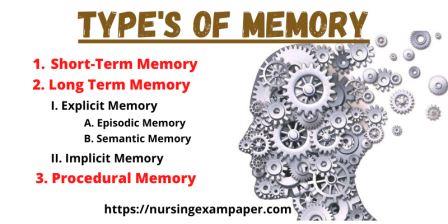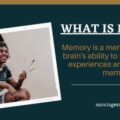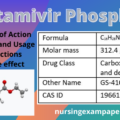There are many types of memory, in this article, we have briefly described the types of memory. They are short-term memory, long-term memory, and procedural memory. Long-term memory is further divided into explicit memories and implicit memories. Explicit memory is also divided into episodic memory and semantic memory. The brief description is as follows. What Is Memory its Definition Parts
Short-Term Memory
This type of memory is also called working memory because working memory is more useful for the information we receive, use it quickly, then discard it. For example, a person’s name, phone number, or list of items you are about to buy from the market are stored in your short-term working memory as long as you use it. That is, for work time.
Short-term memory lasts only a few seconds to minutes. It then stores the information temporarily and then either erase it or transfers it to long-term memory.
Long term memory
Our long-term memories are more complex than short-term memories. Anything that happened more than a few minutes ago will be stored in long-term memory. Depending on how often we remember or use a certain amount of information, the strength of memory varies.
Long-term memory is divided into two parts. – explicit memories and implicit memories
I. Explicit Memory
Explicit memories are a type of long-term memory that you remember after consciously thinking about it. For example, the name of your childhood dog or the phone number of your best friend’s house!
There are two types of explicit memory – episodic memory and semantic memory.
(a). Episodic Memory
Episodic memories are a type of explicit memory that deals with our own personal lives. For example, a particularly exciting Dipawali morning, the day you got married, or even what you ate for dinner the previous night.
Our ability to retain contextual memories depends on how emotionally powerful the experiences were. For example, many people remember where they were and what they were doing at the time of 9/11. Not only will this involve a very powerful emotional reaction, but you will probably be very focused on what happened.
When our brains are highly focused, it becomes easier to process and store sensory input, making it easier to remember the experience later.
Head Injury/Brain Injury Causes & Classification
(b) Semantic Memory
Semantic memory is responsible for our general knowledge about the world. For example, the fact that the earth is round, the sky is blue, elephants have a trunk, and dogs are loyal to their owners.
Unlike episodic memory, we are able to maintain the strength and accuracy of our semantic memory over time. But as we get older, it gradually diminishes.
II. Implicit Memory
This memory is the second major type of long-term memory. This includes memories that you do not need to recall consciously. For example, riding a bike or car and speaking a language. Even though it requires a lot of conscious thought to learn, at some point, it becomes implies that you can now do it automatically.
In the 1990 film Total Recall, Arnold Schwarzenegger dreams of becoming a secret agent on Mars, without knowing that he was actually a secret agent on Mars before his memory is erased and rewritten. This subconscious attraction to espionage and other planets may be a kind of implicit memory for Arnold.
Procedural Memory
Procedural memory is a types of implicit memory that allows us to perform certain tasks without thinking about them. This includes tying a shoe, brushing teeth, or driving a car in addition to riding a bike.
It is likely that procedural memory is stored in a different part of the brain than episodic memory because people who experience traumatic brain injuries often forget or forget autobiographical information such as how to walk or feed themselves. is. simple work to do.
Mechanism of Memory
According to the modern definition, our memory is a collective process consisting of three main stages. Firstly in its first phase, the information is encoded. After this, in the second phase, this encrypted information is collected and in the last third phase, it is remembered.
Encoding Information
In order for us to feel the environment around us, it is first necessary that the environmental stimuli are received by the sense organs related to it. For example, to see any object, we receive the reflected light from it through our eyes. Now this reflected light is converted into weak electrical waves by the sensory nerve cells (rods and cones) present in the retina of the eye. Now it can be said that the encoding of the light stimulus present in the environment by the retina was done in an electrical form. Now, this light electric wave travels to the visual area of the brain and is explained here. On the basis of this interpretation, we form a reflection of the scene in front of us in our minds. This whole process is called visual perception or seeing. At the time of coding, information is mainly coded on the basis of location, time, and frequency.
Collection of information
After coding the information comes the place of their storage. This storage can be at the sensory level or at the level of short-term memory or at the level of long-term memory. It would be worth mentioning here that there may be slight changes in the information in our brain at the time of storage. Meaning that the information will not remain as it was in the original. In them, we can add something we have or we can also remove some part of that information. If there is half incomplete information, then we can also fabricate it on the basis of our imagination power. Because of this quality, memory is a constructive process. Memory is further classified on the basis of the storage of information in memory.
Remembrance
How do we know if we have a memory of a particular time or place? Only when we remember him. For example, if asked to name five teachers of your childhood whose teachings have made the most impact on your life, we will not take long to answer. But if we ask that from the year 2000 to 2005, give the names of the Nobel Prize winners in biology or any field, then we may have to think for a while. It becomes clear here that what we remember and what things we forget, all depends on our motivations, conscious and unconscious desires, etc. Therefore, remembrance is an essential part of total memory.






